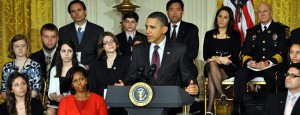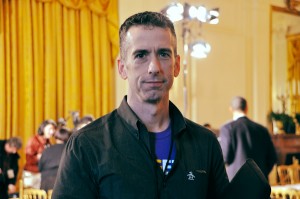National
White House hosts anti-bullying conference
Obama unveils stopbullying.gov as resource to address harassment

President Obama on Thursday opened the doors of the White House to anti-bullying advocates for a conference in which participants discussed harassment of students and devised strategies to curtail bullying.
In remarks starting off the conference, Obama said if the conference had one goal, it would be dispel the myth that bullying is “a harmless rite of passage or an inevitable part of growing up.”
“It’s not,” he said. “Bullying can have destructive consequences for our young people. And it’s not something we have to accept. As parents and students, as teachers and members of the community, we can take steps — all of us — to help prevent bullying and create a climate in our schools in which all of our children can feel safe; a climate in which they all can feel like they belong.”
The conference, in which around 150 students, parents, teachers and anti-bullying advocates participated, wasn’t specifically directed toward the bullying of LGBT students, although harassment of children because of their sexual orientation or gender identity was often mentioned.
Bullying against LGBT students received renewed attention late last year when several young men who were gay or perceived to be gay took their own lives after they were reportedly bullied. Among them was Tyler Clementi, a Rutgers University student, who leaped off the George Washington Bridge in September after a video was posted online of him reportedly having a sexual encounter with another man in his dorm room.
During his remarks, Obama noted that students who are gay are among the types of children who often face bullying at school.
“A third of middle school and high school students have reported being bullied during the school year,” Obama said. “Almost 3 million students have said they were pushed, shoved, tripped, even spit on. It’s also more likely to affect kids that are seen as different, whether it’s because of the color of their skin, the clothes they wear, the disability they may have, or sexual orientation.”
Obama also announced that his administration had launched a new website, stopbullying.gov, as a resource housed within the Department of Health & Human Services for parents, students and teachers on how to confront the issue of bullying in schools. The website is set to provide information on the risks of bullying and its warning signs and effects.
First lady Michelle Obama, who introduced the president at the start of the event, said the issue of bullying is personal for both her and her hisband because of their concern for their two daughters: Malia and Sasha.
“As parents, this issue really hits home for us,” she said. “As parents, it breaks our hearts to think that any child feels afraid every day in the classroom, or on the playground, or even online. It breaks our hearts to think about any parent losing a child to bullying, or just wondering whether their kids will be safe when they leave for school in the morning.”
Michelle Obama urged parents “to make a real effort to be engaged in our children’s lives” and to listen to them and be there when needed.
“We need to get involved in their schools and in their activities so that we know what they’re up to, both in and out of the classroom,” she said. “And when something is wrong, we need to speak up, and we need to take action.”
Following the president remarks, Valerie Jarrett, senior adviser to the president, led a panel discussion of anti-bullying experts to discuss ways that parents, administrators and government officials can work to curtail harassment of students.
Points that were mentioned included recommending that parents be friends with their children on Facebook for oversight purposes and how the behavior of those who perpetuate bullying must also be addressed as part of anti-bullying efforts.
After the panel, conference participants split into five break-out sessions for more extensive debate on particular issues related to bullying. Topics of the breakout session included cyberbullying and in-school programs to confront bullying.
Top Obama administration officials during a wrap-up session at the close of the conference emphasized the support that anti-bullying advocates have in the White House.
Education Secretary Arne Duncan announced a new initiative — a technical assistance center — which would specifically address harassment to complement anti-bullying efforts that are already underway.
“By trying to highlight these best practices, we will state and local policy makers and educators work to keep children safe and provide the best learning environment for all students,” Duncan said. “We can provide support, which is why I’m happy to announce today our department’s intention to establish a new technical assistance center specifically dedicated to bullying prevention.”
Secretary of Health & Human Services Kathleen Sebelius urged teachers and others to speak out when anti-gay slurs are used in schools.
“Building safe neighborhoods and schools where young people can thrive is a job for all of us,” Sebelius said. “It means speaking out next time you hear a homophobic slur, stepping in when you see someone being preyed upon and letting your local education leaders — from principals to schools — know that bullying is not an isolated part of growing up. It’s a serious danger for all of our children.”
Participants had a largely positive reaction to the event and thought it was productive in devising strategies to thwart bullying.
In a statement, Jeff Krehely, director of the LGBT research and communications project at the Center for American Progress, said the conference “put a national spotlight” on bullying and its potentially “destructive impact.”
“Although the event is born out of tragedies, the conference will hopefully spark a robust national discussion about what we can all do to stop this problem,” Krehely said. “With an increase in bullying and full-on assaults on youth who are perceived to be gay or transgender, as well as those who are perceived to be Muslim, now is the right time to show leadership on this issue.”
Caleb Laiseki, executive director of the Arizona-based Gays & Lesbians United Against Discrimination, said the conference was “much more productive” than he expected.
“I’m coming from Arizona, and Arizona can’t even pass the anti-bullying bill through committee, so I was extremely happy to see the White House was very dedicated to this,” Laiseki said.
Laiseki, who’s 16 and gay, dropped out of high school after he was bullied because of his sexual orientation and completed his education by earning a general equivalency diploma. He founded GLUAD to help address the problems he faced in school.
“The reason I started the organization was because I was pushed into lockers and humiliated,” he said. “I received death threats [and was] followed home. It was just one thing after another. And I also had friend commit suicide after several attempts. So, the main goal of GLAUD is homelessness, suicide prevention and anti-bullying work.”
Laiseki attended the breakout session focused on cyber-bullying and said he proposed that law enforcements have the tools to intervene immediately when such harassment takes place.
“We can immediately track down the [Internet protocol] address and go from there,” Laiseki said. “And both of the representatives [from the Obama administration] were in agreement. And we took notes actually and discussed it for at least one-third of the meeting.”
Dan Savage, founder of the “It Gets Better” online video campaign aimed at helping troubled LGBT teens, said the conference was of “tremendous symbolic importance” because it identified bullying as a national problem, but said more could be done with the issue of parents being the bullies of LGBT youth.
“What was never addressed is when the parents are the bullies,” Savage said. “LGBT kids whose parents reject them are eight times likelier to attempt suicide; kids who are LGBT are four times. It literally doubles the risk of the already quadrupled risk of suicide for LGBT kids when their families reject them.”
Legislation pending before Congress known as the Student Non-Discrimination Act and the Safe Schools Improvement Act would address the issue of LGBT bullying of students in schools. Savage, who’s gay and also a sex-advice columnist, said the passage of this legislation would be effective.
“It puts schools on notice,” Savage said. “It establishes a national sense of accountability. Schools are reactive. They don’t like to be sued. They don’t like to get in trouble with the folks that pay the bills — at the federal or state level — and it really creates a way for school administrators and school boards to be held accountable.”
Shannon Cuttle, director of Safe Schools Action Network, said she felt the event was effective because it drew more attention to the issue of bullying.
“I think that anytime that you can collectively get a group of people to work in collaboration to try to discuss this issue, it’s going to put a dent in the issue,” Cuttle said. “Today is making the right step. Being able to bring people from across America — teachers, administrators, individuals and students — that’s key.”
But Cuttle, a lesbian D.C. activist, said the best way to address the issue of bullying in schools to confront harassment with “boots on the ground.”
“We have to be able to go into the schools, we have to have conversations and we have to be able to discuss the issue,” she said. “We have to be able to have those honest, open conversations with teachers and school administrators, and as parents and students, we need to talk to our school boards and local officials and be able to put rules and policies in place to keep kids safe.”
Pennsylvania
Malcolm Kenyatta could become the first LGBTQ statewide elected official in Pa.
State lawmaker a prominent Biden-Harris 2024 reelection campaign surrogate

Following his win in the Democratic primary contest on Wednesday, Pennsylvania state Rep. Malcolm Kenyatta, who is running for auditor general, is positioned to potentially become the first openly LGBTQ elected official serving the commonwealth.
In a statement celebrating his victory, LGBTQ+ Victory Fund President Annise Parker said, “Pennsylvanians trust Malcolm Kenyatta to be their watchdog as auditor general because that’s exactly what he’s been as a legislator.”
“LGBTQ+ Victory Fund is all in for Malcolm, because we know he has the experience to win this race and carry on his fight for students, seniors and workers as Pennsylvania’s auditor general,” she said.
Parker added, “LGBTQ+ Americans are severely underrepresented in public office and the numbers are even worse for Black LGBTQ+ representation. I look forward to doing everything I can to mobilize LGBTQ+ Pennsylvanians and our allies to get out and vote for Malcolm this November so we can make history.”
In April 2023, Kenyatta was appointed by the White House to serve as director of the Presidential Advisory Commission on Advancing Educational Equity, Excellence and Economic Opportunity for Black Americans.
He has been an active surrogate in the Biden-Harris 2024 reelection campaign.
The White House
White House debuts action plan targeting pollutants in drinking water
Same-sex couples face higher risk from environmental hazards

Headlining an Earth Day event in Northern Virginia’s Prince William Forest on Monday, President Joe Biden announced the disbursement of $7 billion in new grants for solar projects and warned of his Republican opponent’s plans to roll back the progress his administration has made toward addressing the harms of climate change.
The administration has led more than 500 programs geared toward communities most impacted by health and safety hazards like pollution and extreme weather events.
In a statement to the Washington Blade on Wednesday, Brenda Mallory, chair of the White House Council on Environmental Quality, said, “President Biden is leading the most ambitious climate, conservation, and environmental justice agenda in history — and that means working toward a future where all people can breathe clean air, drink clean water, and live in a healthy community.”
“This Earth Week, the Biden-Harris Administration announced $7 billion in solar energy projects for over 900,000 households in disadvantaged communities while creating hundreds of thousands of clean energy jobs, which are being made more accessible by the American Climate Corps,” she said. “President Biden is delivering on his promise to help protect all communities from the impacts of climate change — including the LGBTQI+ community — and that we leave no community behind as we build an equitable and inclusive clean energy economy for all.”
Recent milestones in the administration’s climate policies include the U.S. Environmental Protection Agency’s issuance on April 10 of legally enforceable standard for detecting and treating drinking water contaminated with polyfluoroalkyl substances.
“This rule sets health safeguards and will require public water systems to monitor and reduce the levels of PFAS in our nation’s drinking water, and notify the public of any exceedances of those levels,” according to a White House fact sheet. “The rule sets drinking water limits for five individual PFAS, including the most frequently found PFOA and PFOS.”
The move is expected to protect 100 million Americans from exposure to the “forever chemicals,” which have been linked to severe health problems including cancers, liver and heart damage, and developmental impacts in children.
An interactive dashboard from the United States Geological Survey shows the concentrations of polyfluoroalkyl substances in tapwater are highest in urban areas with dense populations, including cities like New York and Los Angeles.
During Biden’s tenure, the federal government has launched more than 500 programs that are geared toward investing in the communities most impacted by climate change, whether the harms may arise from chemical pollutants, extreme weather events, or other causes.
New research by the Williams Institute at the UCLA School of Law found that because LGBTQ Americans are likelier to live in coastal areas and densely populated cities, households with same-sex couples are likelier to experience the adverse effects of climate change.
The report notes that previous research, including a study that used “national Census data on same-sex households by census tract combined with data on hazardous air pollutants (HAPs) from the National Air Toxics Assessment” to model “the relationship between same-sex households and risk of cancer and respiratory illness” found “that higher prevalence of same-sex households is associated with higher risks for these diseases.”
“Climate change action plans at federal, state, and local levels, including disaster preparedness, response, and recovery plans, must be inclusive and address the specific needs and vulnerabilities facing LGBT people,” the Williams Institute wrote.
With respect to polyfluoroalkyl substances, the EPA’s adoption of new standards follows other federal actions undertaken during the Biden-Harris administration to protect firefighters and healthcare workers, test for and clean up pollution, and phase out or reduce use of the chemicals in fire suppressants, food packaging, and federal procurement.
Maine
Maine governor signs transgender, abortion sanctuary bill into law
Bomb threats made against lawmakers before measure’s passage

BY ERIN REED | On Tuesday, Maine Gov. Janet Mills signed LD 227, a sanctuary bill that protects transgender and abortion providers and patients from out-of-state prosecution, into law.
With this action, Maine becomes the 16th state to explicitly protect trans and abortion care in state law from prosecution. This follows several bomb threats targeting state legislators after social media attacks from far-right anti-trans influencers such as Riley Gaines and Chaya Raichik of Libs of TikTok.
An earlier version of the bill failed in committee after similar attacks in January. Undeterred, Democrats reconvened and added additional protections to the bill before it was passed into law.
The law is extensive. It asserts that gender-affirming care and reproductive health care are “legal rights” in Maine. It states that criminal and civil actions against providers and patients are not enforceable if the provision or access to that care occurred within Maine’s borders, asserting jurisdiction over those matters.
It bars cooperation with out-of-state subpoenas and arrest warrants for gender-affirming care and abortion that happen within the state. It even protects doctors who provide gender-affirming care and abortion from certain adverse actions by medical boards, malpractice insurance, and other regulating entities, shielding those providers from attempts to economically harm them through out-of-state legislation designed to dissuade them from providing care.
You can see the findings section of the bill here:
The bill also explicitly enshrines the World Professional Association of Transgender Health’s Standards of Care, which have been the target of right-wing disinformation campaigns, into state law for the coverage of trans healthcare:
The bill is said to be necessary due to attempts to prosecute doctors and seek information from patients across state lines. In recent months, attorneys general in other states have attempted to obtain health care data on trans patients who traveled to obtain care. According to the U.S. Senate Finance Committee, attorneys general in Tennessee, Indiana, Missouri, and Texas attempted to obtain detailed medical records “to terrorize transgender teens in their states … opening the door to criminalizing women’s private reproductive health care choices.”
The most blatant of these attempts was from the attorney general of Texas, who, according to the Senate Finance Committee, “sent demands to at least two non-Texas entities.” One of these entities was Seattle Children’s Hospital, which received a letter threatening administrators with arrest unless they sent data on Texas patients traveling to Seattle to obtain gender-affirming care.
Seattle Children’s Hospital settled that case out of court this week, agreeing to withdraw its Texas business registration in return for Texas dropping its investigation. This likely will have no impact on Seattle Children’s Hospital, which has stated it did not treat any youth via telemedicine or in person in Texas; the hospital will be able to continue treating Texas youth who travel outside of Texas to obtain their care. That settlement was likely compelling due to a nearly identical law in Washington that barred out-of-state investigations on trans care obtained solely in the state of Washington.
The bill has faced a rocky road to passage. A similar bill was debated in January, but after coming under intense attack from anti-trans activists who misleadingly called it a “transgender trafficking bill,” the bill was voluntarily withdrawn by its sponsor.
When LD 227 was introduced, it faced even more attacks from Gaines and Libs of TikTok. These attacks were followed by bomb threats that forced the evacuation of the legislature, promising “death to pedophiles” and stating that a bomb would detonate within a few hours in the capitol building.
Despite these threats, legislators strengthened both the abortion and gender-affirming care provisions and pressed forward, passing the bill into law. Provisions found in the new bill include protecting people who “aid and assist” gender-affirming care and abortion, protections against court orders from other states for care obtained in Maine, and even protections against adverse actions by health insurance and malpractice insurance providers, which have been recent targets of out-of-state legislation aimed at financially discouraging doctors from providing gender-affirming care and abortion care even in states where it is legal.
See a few of the extensive health insurance and malpractice provisions here:
Speaking about the bill, Gia Drew, executive director of Equality Maine, said in a statement, “We are thrilled to see LD 227, the shield bill, be signed into law by Gov. Mills. Thanks to our pro equality and pro reproductive choice elected officials who refused to back down in the face of disinformation. This bill couldn’t come into effect at a better time, as more than 40 percent of states across the country have either banned or attempted to block access to reproductive care, which includes abortions, as well as transgender healthcare for minors. Thanks to our coalition partners who worked tirelessly to phone bank, lobby, and get this bill over the finish line to protect community health.”
Destie Hohman Sprague of the Maine Women’s Lobby celebrated the passage of the bill despite threats of violence, saying in a statement, “A gender-just Maine ensures that all Mainers have access to quality health care that supports their mental and physical wellbeing and bodily autonomy, including comprehensive reproductive and gender-affirming care. We celebrate the passage of LD 227, which helps us meet that goal. Still, the patterns of violence and disinformation ahead of the vote reflected the growing connections between misogyny, extremism, and anti-democratic threats and actions. We must continue to advocate for policies that protect bodily autonomy, and push back against extremist rhetoric that threatens our states’ rights and our citizens’ freedoms.”
The decision to pass the legislation comes as the Biden administration released updated HIPAA protections that protect “reproductive health care” from out-of-state prosecutions and investigations.
Although the definition of “reproductive health care” is broad in the new HIPAA regulations, it is uncertain whether they will include gender-affirming care. For at least 16 states, though, gender-affirming care is now explicitly protected by state law and shielded from out-of-state legislation, providing trans people and those seeking abortions with protections as the fight increasingly crosses state lines.
****************************************************************************

Erin Reed is a transgender woman (she/her pronouns) and researcher who tracks anti-LGBTQ+ legislation around the world and helps people become better advocates for their queer family, friends, colleagues, and community. Reed also is a social media consultant and public speaker.
******************************************************************************************
The preceding article was first published at Erin In The Morning and is republished with permission.
-

 State Department2 days ago
State Department2 days agoState Department releases annual human rights report
-

 Maryland4 days ago
Maryland4 days agoJoe Vogel campaign holds ‘Big Gay Canvass Kickoff’
-

 Politics3 days ago
Politics3 days agoSmithsonian staff concerned about future of LGBTQ programming amid GOP scrutiny
-

 The White House1 day ago
The White House1 day agoWhite House debuts action plan targeting pollutants in drinking water















